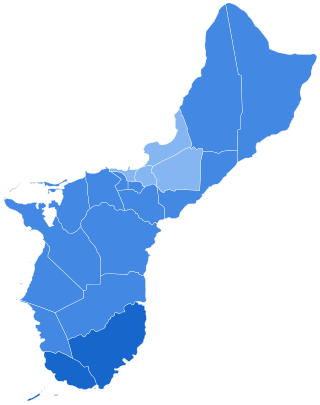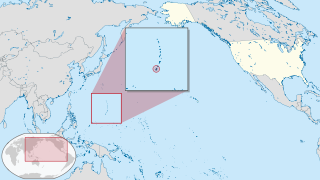Guam elects on the territorial level a governor and a legislature with the governor elected for a four-year term by the people. The Legislature of Guam has fifteen members elected at large in an open primary for two year terms.
The results of the 2008 Democratic Party presidential primaries are the detailed outcomes of a series of contests by which members of the United States Democratic Party chose their candidate for the 2008 U.S. presidential election. The contests are held in each of the fifty U.S. states, as well as the District of Columbia, Puerto Rico, American Samoa, Guam, the U.S. Virgin Islands, and Democrats Abroad. The Northern Mariana Islands was the lone U.S. state or territory which did not have a primary or caucus election in 2008. The outcomes include totals of delegates selected as well as popular votes.
Voting rights of citizens in Guam differ from those of United States citizens in each of the fifty states and in Washington, D.C. In the U.S. House of Representatives, Guam is entitled to a delegate, who is not allowed to vote on the floor of the House but can vote on procedural matters and in House committees. Citizens of Guam may not vote in general elections for president.

The 2016 United States elections were held on Tuesday, November 8, 2016. Republican nominee Donald Trump defeated Democratic former Secretary of State Hillary Clinton in the presidential election, while Republicans retained control of Congress. This marked the first time Republicans won or held unified control of the presidency and Congress since 2004, and would not do so again until 2024.

The 2016 United States presidential straw poll in Guam was held on November 8, 2016. Guam is a territory and not a state. Thus, it is ineligible to elect members of the Electoral College, who would then in turn cast direct electoral votes for president and for vice president. To draw attention to this fact, the territory conducts a non-binding presidential straw poll during the general election as if they did elect members to the Electoral College.
The 2016 Guam Republican presidential caucuses took place on March 12 in the U.S. territory of Guam as one of the Republican Party's primaries ahead of the 2016 presidential election.
The 2016 Guam Democratic presidential caucuses took place on May 7 in the U.S. territory of Guam as one of the Democratic Party's primaries ahead of the 2016 presidential election.

The 2012 United States presidential straw poll in Guam was held on November 6, 2012. Guam is a territory and not a state. Thus, it is ineligible to elect members of the Electoral College, who would then in turn cast direct electoral votes for president and for vice president. To draw attention to this fact, the territory conducts a non-binding presidential straw poll during the general election as if they did elect members to the Electoral College.

The 2008 United States presidential straw poll in Guam was held on November 4, 2008. Guam is a territory and not a state. Thus, it is ineligible to elect members of the Electoral College, who would then in turn cast direct electoral votes for president and for vice president. To draw attention to this fact, the territory conducts a non-binding presidential straw poll during the general election as if they did elect members to the Electoral College.

The 2020 United States presidential straw poll in Guam was held on November 3, 2020. Guam is a territory and not a state. Thus, it is ineligible to elect members of the Electoral College, who would then in turn cast direct electoral votes for president and for vice president. To draw attention to this fact, the territory conducts a non-binding presidential straw poll during the general election as if they did elect members to the Electoral College.

Because it is a U.S. territory instead of a U.S. state, voters in Guam are ineligible to elect members of the Electoral College, who would then cast direct electoral votes for president and vice president. The territory nonetheless conducts a non-binding straw poll on the day of the presidential general election to gauge the preference for president every election year.

The 2024 United States presidential straw poll in Guam took place on November 5, 2024. Guam is a territory and not a state, making it ineligible to elect members of the Electoral College. Instead, Guam conducts a non-binding presidential straw poll during the general election.

Although Guam did not participate in the 2020 presidential election because it is a U.S. territory and not a state, it still participated in the U.S. presidential primaries and caucuses. Former vice president Joe Biden won the Democratic caucus, held on June 6. The Republican caucus, held on March 14 in the form of a "state convention", endorsed incumbent President Donald Trump.

The 1980 United States presidential straw poll in Guam was the first presidential straw poll held in Guam on November 4, 1980. Guam is a territory and not a state. Thus, it is ineligible to elect members of the Electoral College, who would then in turn cast direct electoral votes for president and for vice president. To draw attention to this fact, the territory conducts a non-binding presidential straw poll during the general election as if they did elect members to the Electoral College.

Although Puerto Rico does not participate in U.S. presidential general elections because it is an unincorporated territory and not a state, and therefore cannot send members to the U.S. Electoral College, Puerto Ricans are citizens of the United States and are able to participate in the U.S. presidential primaries.
Although Guam did not participate in the 2024 presidential election because it is a U.S. territory and not a state, it participated in the presidential primaries and caucuses.

The 1984 United States presidential straw poll in Guam was held on November 6, 1984, Guam is a territory and not a state. Thus, it is ineligible to elect members of the Electoral College, instead, the territory conducts a non-binding presidential straw poll during the general election. In turn cast direct electoral votes for president and for vice president.

The 1992 United States presidential straw poll in Guam was held on November 3, 1992, Guam is a territory and not a state. Thus, it is ineligible to elect members of the Electoral College, instead, the territory conducts a non-binding presidential straw poll during the general election. In turn cast direct electoral votes for president and vice president.

The 2004 United States presidential straw poll in Guam took place on November 2, 2004, Guam is a territory and not a state. Thus, it is ineligible to elect members of the Electoral College, instead, the territory conducts a non-binding presidential straw poll during the general election. In turn cast direct electoral votes for president and vice president.












